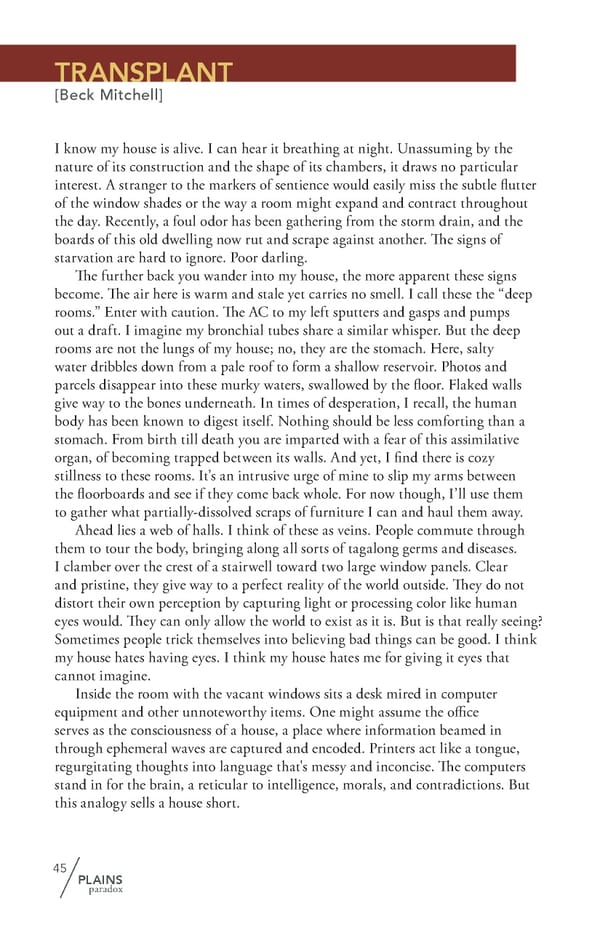TRANSPLANT [Beck Mitchell] I know my house is alive. I can hear it breathing at night. Unassuming by the nature of its construction and the shape of its chambers, it draws no particular interest. A stranger to the markers of sentience would easily miss the subtle flutter of the window shades or the way a room might expand and contract throughout the day. Recently, a foul odor has been gathering from the storm drain, and the boards of this old dwelling now rut and scrape against another. The signs of starvation are hard to ignore. Poor darling. The further back you wander into my house, the more apparent these signs become. The air here is warm and stale yet carries no smell. I call these the “deep rooms.” Enter with caution. The AC to my left sputters and gasps and pumps out a draft. I imagine my bronchial tubes share a similar whisper. But the deep rooms are not the lungs of my house; no, they are the stomach. Here, salty water dribbles down from a pale roof to form a shallow reservoir. Photos and parcels disappear into these murky waters, swallowed by the floor. Flaked walls give way to the bones underneath. In times of desperation, I recall, the human body has been known to digest itself. Nothing should be less comforting than a stomach. From birth till death you are imparted with a fear of this assimilative organ, of becoming trapped between its walls. And yet, I find there is cozy stillness to these rooms. It’s an intrusive urge of mine to slip my arms between the floorboards and see if they come back whole. For now though, I’ll use them to gather what partially-dissolved scraps of furniture I can and haul them away. Ahead lies a web of halls. I think of these as veins. People commute through them to tour the body, bringing along all sorts of tagalong germs and diseases. I clamber over the crest of a stairwell toward two large window panels. Clear and pristine, they give way to a perfect reality of the world outside. They do not distort their own perception by capturing light or processing color like human eyes would. They can only allow the world to exist as it is. But is that really seeing? Sometimes people trick themselves into believing bad things can be good. I think my house hates having eyes. I think my house hates me for giving it eyes that cannot imagine. Inside the room with the vacant windows sits a desk mired in computer equipment and other unnoteworthy items. One might assume the office serves as the consciousness of a house, a place where information beamed in through ephemeral waves are captured and encoded. Printers act like a tongue, regurgitating thoughts into language that's messy and inconcise. The computers stand in for the brain, a reticular to intelligence, morals, and contradictions. But this analogy sells a house short. 45 PLAINS paradox
 Plains Paradox 2023 Page 53 Page 55
Plains Paradox 2023 Page 53 Page 55